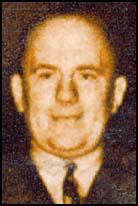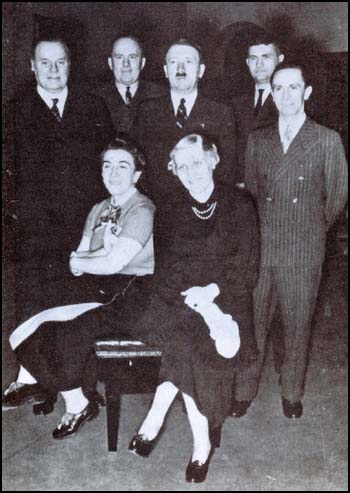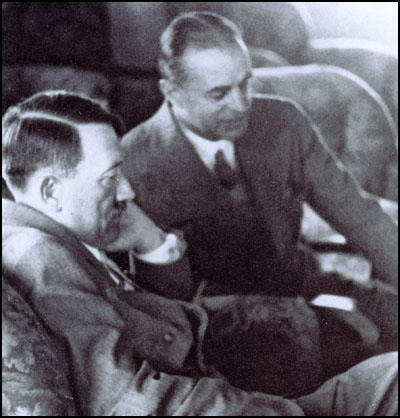George Ward Price

George Ward Price was born in 1886. After attending the University of Cambridge he became a journalist and was eventually recruited by The Daily Mail. As the newspaper's foreign correspondent he developed a close relationship with Adolf Hitler. According to the German historian, Hans-Adolf Jacobsen: "The famous special correspondent of the London Daily Mail, Ward Price, was welcomed to interviews in the Reich Chancellery in a more privileged way than all other foreign journalists, particularly when foreign countries had once more been brusqued by a decision of German foreign policy. His paper supported Hitler more strongly and more constantly than any other newspaper outside Germany."
Franklin Reid Gannon, the author of The British Press and Germany (1971), has claimed that Hitler regarded him as "the only foreign journalist who reported him without prejudice". In his autobiography, Extra-Special Correspondent (1957), Ward Price defended himself against the charge he was a fascist by claiming: "I reported Hitler's statements accurately, leaving British newspaper readers to form their own opinions of their worth."
Ward Price was also a intimate associate of Oswald Mosley and a supporter of the National Union of Fascists (BUF). He was also a founding member of the January Club in 1934. The object of the group was to attract Establishment support for the BUF. Members included Robert Forgan, Francis Yeats-Brown, Sir Louis Greig; Lord Erskine and Lord William Montagu-Douglas-Scott.
According to Jim Wilson, the author of Nazi Princess: Hitler, Lord Rothermere and Princess Stephanie Von Hohenlohe (2011):: "George Ward Price, by 1934 had built up a unique rapport with Hitler, was a close friend of Mosley's and a leading figure in the January Club, conceived the idea for Mosley and Rothermere to go into business together by forming a company, in May 1934, called New Epoch Products Ltd. The plan was for the company to manufacture a range of goods, including cigarettes, which would be distributed via the 500 or so Blackshirt chapters that had been formed throughout the country."
When Lord Rothermere, the owner of the The Daily Mail, took Ward Price with him when he met Adolf Hitler for the first time in December 1934. At the first meeting Hitler told Rothermere that "Lloyd George and your brother won the war for Britain. This was a reference to the Prime Minister David Lloyd George and Lord Northcliffe, who it was claimed made sure that the British Army received enough munitions on the front-line during the later stages of the First World War. That evening Hitler held his first major dinner party he had given for foreign visitors at his official residence in Berlin since he had taken office. The high-level guests included Joseph Goebbels, Hermann Goering and Joachim von Ribbentrop.

with Princess Stephanie and Magda Goebbels sitting in front. (January, 1936)
On 20th December, 1934, Lord Rothermere returned the hospitality, hosting a dinner at Berlin's famous Hotel Adlon. Princess Stephanie von Hohenlohe was placed in charge of the arrangements. Twenty-five guests attended including Adolf Hitler, Germany's Foreign Minister Konstantin von Neurath, Joseph Goebbels, Magda Goebbels, Hermann Goering, accompanied by the actress Emmy Sonnemann. Also invited was British banker Ernest Tennant, one of the principal founders of the Anglo-German Fellowship.
As Richard Griffiths, the author of Fellow Travellers of the Right (1979) has pointed out: "Rothermere visited Hitler on a number of occasions, and corresponded with him. As we have seen, Hitler's first major dinner party for foreigners, on 19th December 1934, had as its guests of honour Rothermere, his son Esmond Harmsworth, and Ward Price, together with Ernest Tennant. Rothermere's subsequent article in the Daily Mail was violently enthusiastic about what Hitler had done for Germany. Hitler wrote a number of important letters to Rothermere in 1933 and 1934, but the most interesting of them, because of its subsequent fate, was the one written on 3 May 1935 in which he advocated Anglo-German understanding as a firm combination for peace. Rothermere circulated this to many politicians, convinced that his personal contact with Hitler had produced a real breakthrough."
Lord Rothermere also gave full support to Oswald Mosley and the National Union of Fascists. He wrote an article, Hurrah for the Blackshirts, on 22nd January, 1934, in which he praised Mosley for his "sound, commonsense, Conservative doctrine". Rothermere added: "Timid alarmists all this week have been whimpering that the rapid growth in numbers of the British Blackshirts is preparing the way for a system of rulership by means of steel whips and concentration camps. Very few of these panic-mongers have any personal knowledge of the countries that are already under Blackshirt government. The notion that a permanent reign of terror exists there has been evolved entirely from their own morbid imaginations, fed by sensational propaganda from opponents of the party now in power. As a purely British organization, the Blackshirts will respect those principles of tolerance which are traditional in British politics. They have no prejudice either of class or race. Their recruits are drawn from all social grades and every political party. Young men may join the British Union of Fascists by writing to the Headquarters, King's Road, Chelsea, London, S.W."
The Daily Mail continued to give its support to the fascists. George Ward Price wrote about anti-fascist demonstrators at a meeting of the National Union of Fascists on 8th June, 1934: "If the Blackshirts movement had any need of justification, the Red Hooligans who savagely and systematically tried to wreck Sir Oswald Mosley's huge and magnificently successful meeting at Olympia last night would have supplied it. They got what they deserved. Olympia has been the scene of many assemblies and many great fights, but never had it offered the spectacle of so many fights mixed up with a meeting."
Lord Rothermere continued to support Hitler but tried to keep it secret from the general public. It later emerged that Rothermere was paying a retainer of £5,000 per year (£200,000 in today's money) to Princess Stephanie von Hohenlohe, a close confidante of Adolf Hitler, Joseph Goebbels, Hermann Goering, Heinrich Himmler and Joachim von Ribbentrop. According to The Daily Telegraph: "In 1933, the year that Hitler gained power, MI6 circulated a report stating that the French secret service had discovered documents in the princess's flat in Paris ordering her to persuade Rothermere to campaign for the return to Germany of territory ceded to Poland at the end of First World War. She was to receive £300,000 – equal to £13 million today if she succeeded."

George Ward Price, Lord Rothermere and Princess Stephanie von Hohenlohe were invited to spend time with Hitler at his holiday retreat, The Eagle's Nest, in the mountains above Berchtesgaden. Also invited was Joseph Goebbels. He wrote in his diary: "Rothermere pays me great compliments... Enquires in detail about German press policy. Strongly anti-Jewish. The princess is very pushy. After lunch we retire for a chat. Question of Spain comes up. Führer won't tolerate a hot-bed of communism in Europe any longer. Is ready to prevent any more pro-Republican volunteers from going there. His proposal on controls seem to astonish Rothermere. German prestige is thus restored. Franco will win anyway... Rothermere believes British government also pro-Franco."
Adolf Hitler was kept informed about what British newspapers were saying about him. He was usually very pleased by what appeared in The Daily Mail. On 20th May 1937 he wrote to Lord Rothermere: "Your leading articles published within the last few weeks, which I read with great interest, contain everything that corresponds to my own thoughts as well." Hitler told George Ward Price: "He (Lord Rothermere) is the only Englishman who sees clearly the magnitude of this Bolshevist danger. His paper is doing an immense amount of good." Jim Wilson has argued: "Ward Price... had the reputation of being Fleet Street's most enthusiastic supporter of the Nazis. He was on close terms with all of the leading Nazi hierarchy. He even began affecting the use of a monocle, aping some of the senior Nazis grouped around the Führer."
In 1937 George Ward Price published his book, I Know These Dictators. It was full of praise of Hitler: "Behind the forceful character which he displays in public he had a human, pleasant personality... He had the artistic, visionary tendencies of the South German type... and there was a strong strain of sadness and tenderness in his disposition... Hitler had... a fondness for children and dogs... His personality and prestige were so strong that without any effort on his part, he is surrounded by much awe on the part of his entourage... Hitler is a widely read man... familiar with the works of the leading German philosophers who had mastered the history, geography and social and economic conditions of the chief European countries."
Ward Price defended Hitler's treatment of Jews, trade unionists and socialists in Nazi Germany: "To law-abiding citizens the Nazi Government brought public order, political peace, better living-conditions, and the promise, some fulfilled, to make Germany once more a great nation... Upon the people who opposed, or looked like opposing, its plans, it laid a heavy hand... The jockey who pats his horse in the paddock may lash him in a hard finish. The rulers of Germany were stern because they believed the fate of their country was at stake. If they failed, the gates would be open wide to Bolshevism - the same bloodthirsty Bolshevism which had ravaged and liquidated in Russia, tortured and massacred in Hungary.... The tolerant attitude of the average Anglo-Saxon... toward Jews, Communists, and those deluded intellectuals indulgently termed 'parlour-Bolshevists' appears in Nazi eyes as stupid apathy in the presence of real danger."
According to Richard Griffiths, the author of Fellow Travellers of the Right (1979): "Rothermere and Ward Price, then, used the Daily Mail, up to 1938, as an instrument of Nazi propaganda. As Franklin Gannon points out, there was little news coverage of Germany in that paper (compared with the extensive coverage in other papers), and opinions on Germany were expressed mainly through editorials and reports of Ward Price's interviews. As the thirties wore on, the paper's main concern turned gradually from positive praise of Nazism to a concern to avoid Continental obligations."
After the Second World War Ward Price attempted to cover-up his support of Adolf Hitler. In direct contradiction to his earlier comments, in his book, Extra-Special Correspondent (1957) he wrote: "The many meetings that I had with Hitler... always filled me with astonishment that a man of his neurotic character and limited perceptions should be able to maintain personal domination over a race possessing such varied and conspicuous qualities as the Germans... I was surprised... to see the deference displayed towards him by so many Germans who were his superiors in education, intellect and experience."
Primary Sources
(1) George Ward Price, The Daily Mail (8th June, 1934)
If the Blackshirts movement had any need of justification, the Red Hooligans who savagely and systematically tried to wreck Sir Oswald Mosley's huge and magnificently successful meeting at Olympia last night would have supplied it. They got what they deserved. Olympia has been the scene of many assemblies and many great fights, but never had it offered the spectacle of so many fights mixed up with a meeting.
(2) George Ward Price, I Know These Dictators (1937)
Behind the forceful character which he displays in public he had a human, pleasant personality... He had the artistic, visionary tendencies of the South German type... and there was a strong strain of sadness and tenderness in his disposition... Hitler had... a fondness for children and dogs... His personality and prestige were so strong that without any effort on his part, he is surrounded by much awe on the part of his entourage... Hitler is a widely read man... familiar with the works of the leading German philosophers who had mastered the history, geography and social and economic conditions of the chief European countries....
To law-abiding citizens the Nazi Government brought public order, political peace, better living-conditions, and the promise, some fulfilled, to make Germany once more a great nation... Upon the people who opposed, or looked like opposing, its plans, it laid a heavy hand... The jockey who pats his horse in the paddock may lash him in a hard finish. The rulers of Germany were stern because they believed the fate of their country was at stake. If they failed, the gates would be open wide to Bolshevism - the same bloodthirsty Bolshevism which had ravaged and liquidated in Russia, tortured and massacred in Hungary...
The tolerant attitude of the average Anglo-Saxon... toward Jews, Communists, and those deluded intellectuals indulgently termed "parlour-Bolshevists" appears in Nazi eyes as stupid apathy in the presence of real danger.
(3) George Ward Price, Extra-Special Correspondent (1957)
The many meetings that I had with Hitler... always filled me with astonishment that a man of his neurotic character and limited perceptions should be able to maintain personal domination over a race possessing such varied and conspicuous qualities as the Germans... I was surprised... to see the deference displayed towards him by so many Germans who were his superiors in education, intellect and experience.
(4) Richard Griffiths, Fellow Travellers of the Right (1979)
As far as Anglo-German relations were concerned, Price believed, until very late in the day, that Hitler could be taken to be sincere. Lack of understanding was caused by the fact that, in Britain, the Press, "instead of putting national interest first", was "dominated by a set of vague and visionary principles". On this basis, "undeterred by imperfect knowledge of the facts, societies of British busybodies have acquired the habit of passing votes of censure on foreign Governments whose views are not in harmony with their own". Price contrasted the advantages of dictatorship with the drawbacks of democracy. If only Hitler's proffered hand had been taken on the occasions when it was offered, "Europe might now be on a safer path than the precipitous slope of rearmament which may ultimately lead to the abyss of war."
Price was a realist in one sense. He saw that war was possible, even probable. In such circumstances, he followed the Rothermere line of calling for rearmament, even though negotiations should properly be undertaken to avoid war.
The turning-point, for Price as for so many others, was to be the Nazi invasion of Czechoslovakia in March 1939.
Rothermere and Ward Price, then, used the Daily Mail, up to 1938, as an instrument of Nazi propaganda. As Franklin Gannon points out, there was little news coverage of Germany in that paper (compared with the extensive coverage in other papers), and opinions on Germany were expressed mainly through editorials and reports of Ward Price's interviews. As the thirties wore on, the paper's main concern turned gradually from positive praise of Nazism to a concern to avoid Continental obligations.The rest of the press was, on the whole, less definite in its views. Beaverbrook, "having first despised and then admired the Nazi regime", had been "alienated by its violence, and had come to dislike it for regimenting opinion, supporting the aristocracy, and persecuting the Lutheran Church". Under him the Daily Express was basically isolationist, however, as were its stablemates the Evening Standard and the Sunday Express; though individual articles on Germany from time to time appeared in them, they denoted no particular line of editorial policy. The rest of the press, in the early years of the Nazi regime, ranged between firm opposition, careful fence-sitting, and sheer lack of interest. It was not until Germany's foreign policy forced itself on British attention in the late thirties that more precise attitudes came to be formulated.
